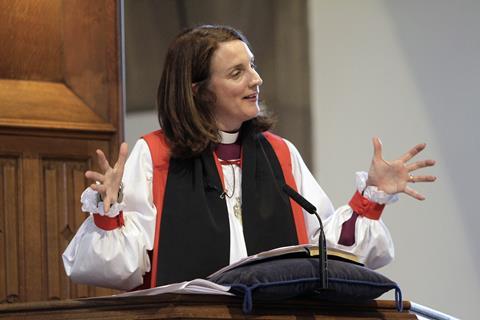Writing ahead of General Synod next week, where bishops’ proposals on blessing same-sex couples will be debated, Bishop Jill Duff says she’s praying for courage in the midst of a threatening storm

We have a Charlie Mackesy print on our wall from his beautiful picture book, The Boy, the Mole, The Fox and the Horse.
It was a lockdown present. The winds are swirling around, the clouds are threatening overhead, but the horse, with his gentle wisdom and quiet gravitas says: “What’s the best thing you’ve learnt about storms? That they end.”
Storms come and go. But the landscape can be hugely changed. Sometimes you wake in the morning and cherished oaks have fallen.
Storms are engulfing the CofE since bishops proposed draft prayers of thanksgiving, dedication and for God’s blessing for same-sex couples following their civil marriage or civil partnership.
While some will welcome these proposals and some will be disappointed they haven’t gone far enough, many of us have quietly experienced deep sadness. I have had a series of people come to see me in tears over the last two weeks.
One young vicar, who leads a mainstream city centre church in Lancashire, summed up many of my conversations, local and national: “It’s like I’m being chucked under the bus.” We usually have Pastoral Guidance to undergird the practical outworking of the services we offer. As things stand, it is at the local level, on the doorstep, that a good proportion of our clergy would have to opt out to the Prayers for God’s Blessing. All our pain-staking work, enabling welcome for LGBT people in our communities, is under threat. It becomes a personal rejection.
Like me, many clergy are unable to use these prayers in good conscience. The Pastoral Guidance is unwritten. Here are two of the other implications of the draft Prayers for God’s Blessing which remain obscured by the storm…
First, Anglican social media can mislead us into believing there’s an inevitable direction of travel towards same-sex marriage. Twitter algorithms are designed to amplify a progressive view. Recall the last general election. #LabourWin was trending on Twitter. It was the worst defeat for Labour in a generation.
Second, like a runway train, under the pressure of press spotlight, it has been suggested we row back from those beautiful standards of the New Testament, so that sex is no longer only for Christian marriage. No theological rationale or carefully weighed discernment.
Did you say sex? Yes. Sex makes headlines. Mention the word - “sex” - people tune in because sex is about intimacy and relationships. And relationships make up the fabric of life and society. That’s why sex is so important.
One church leader recently ran a series on sex and sexuality in his morning services. This included the teaching that sex is for marriage between a man and a woman. Two young women came to faith: “this is weird: we’ve never heard it before, but if that’s what Jesus calls for – then we’re in”. Most of my ministry has been served in deprived urban areas. Local women my age were astonished that I believed sex is for marriage. “You mean I’m worth it?” Our inherited Christian ethics on sex speak preciously into our culture which is craving intimacy and worth, a culture which can squeeze out the dignity of children and value of families. Yes of course, Christian beliefs looks strange at first glance. Jesus’s death on the cross makes no sense until you realise the universe-shattering power of his death.
May we have great courage in our day. And keep our eyes on Jesus. The still centre of all our storms.
I know people say that we’ve appointed women bishops and so same-sex marriage is the next progression. For me, the argument actually works the opposite way round. In the New Testament, there is an incredible honouring of women that went above and beyond the surrounding culture. Whereas in the culture of the day, where there was understanding and approval of same-sex lifelong relationships, the New Testament consistently says something different. It consistently gives a far more ambitious standard that sex is only permitted in male-female marriage. And that teaching has never been welcome. For all my adult life, the Christian view on sex has always been out of step with my friends and colleagues.
Storms are disturbing and threatening. Storms blow up in every generation. Cultural pressures shift and change. Honest to God became a bestseller in 1963. It was written by John Robinson, then Bishop of Woolwich, who felt compelled to mould his beliefs to keep in step with scientific culture and critical scholarship. To make faith accessible to the man in the pub, he argued it was time to jettison the divinity of Jesus, and the miraculous elements of the Christian faith. Few would make his arguments today. The man in the pub is aware that science has its limits. Many believe miracles are possible.
This storm a big one. It threatens clergy on their doorsteps, not just conversations in the pub; it threatens fragility of our LGBT same-sex attracted Christians in their diversity of passionately held views; it threatens to tear further the fabric of the Anglican Communion. Throughout Christian history, storms have come and gone. Some have fractured the church; some have fired our faith. The Methodists were driven out and provided huge new missional energy.
Courage is the biggest factor in church growth and flourishing internationally. May we have great courage in our day. And keep our eyes on Jesus. The still centre of all our storms.
I pray daily for a visitation of the Spirit of Jesus on the Church of England and on our nation. The wind and the waves still obey his voice.





































1 Reader's comment